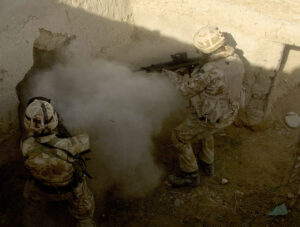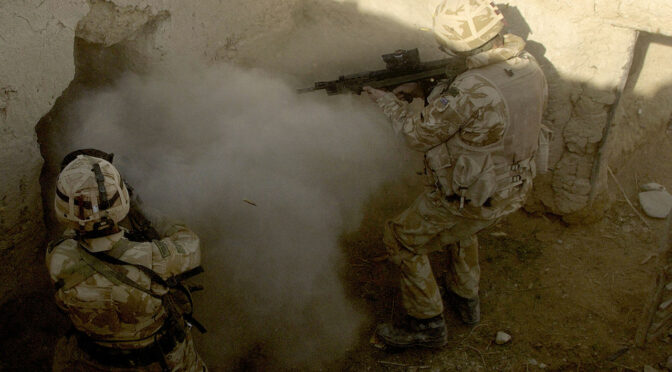COLONEL RICHARD KEMP says Sergeant Blackman should be given special pleading when he is sentenced
The Chief of the Defence Staff says ‘murder is murder’ and there must be no special pleading on behalf of British Marine Sergeant Alexander Blackman when he is sentenced today for murdering an injured insurgent in Afghanistan.
But General Sir Nicholas Houghton could not be more wrong. I believe it is imperative there should be special pleading for a fighting man our government sent into battle with orders to forfeit his life if called upon to do so.
Some 47 per cent of the British public understand this, according to opinion polls, and want leniency to be shown.
No other human activity is comparable with war, and Sgt Blackman’s killing of a wounded Taliban prisoner following an attack on a patrol base in Helmand province is not comparable with gang murders on the streets of Britain.
The court martial having delivered its guilty verdict (two of his comrades were acquitted), there will be pressure to make an example of Sgt Blackman so that the remnants of an unpopular war can be airbrushed away and the national conscience soothed.
Yesterday’s decision to allow the man to be named (after the lifting of a High Court ban that had meant he had previously only been known as ‘Marine A’) will be seen with great anger by many in the Armed Forces.

Royal Marines in Afghanistan
Blackman may be guilty of murder, but identifying him has placed him and his family and friends, at risk of reprisal attacks from Islamist extremists.
You only have to read the horrendous evidence from the trial of those charged with the murder of Fusilier Lee Rigby in Woolwich to understand the terrible dangers our soldiers face, on duty and off, at home and abroad.
All my experience as an infantry soldier, particularly my time commanding British Forces in Afghanistan, tells me the military court should resist any political pressure.
Instead, the court martial members should consider the mitigation for Sgt Blackman’s crime.
It could be summed up by that great British soldier, Field Marshal Montgomery. His view was that a soldier reflected the national character of his country — influenced ‘by his home, his upbringing and his historical traditions’.
In his days, these values were patriotism, chivalry, honour, discipline and self-sacrifice. Back then, soldiers were regular church-goers.
But the past 30 years have seen greater and more rapid change in every aspect of our society than at any time in human history. Soldiers today rarely see the inside of a church and are brought up on movies dripping in gratuitous, unrestrained blood and gore.
It is the influence of this less moral culture — condoned by successive governments pursuing an agenda of secularism and multi-cultural moral relativism — which now determines how a soldier acts under extreme pressure.
General Houghton expects ‘immaculate standards of our people’, and the Royal Marines train their men in the laws of war, professional ethics and the standards and values required of them. But Montgomery explains that ‘no matter what may be instilled into him in the Army, the soldier will retain his individual character, which he
derives from his environment’.
We know of the extraordinary pressures on Sgt Blackman and his comrades throughout their violent tour in 2011. They endured almost daily Taliban attacks. The Marines saw 20 of their men killed or maimed during the six-month tour, and two of Sgt Blackman’s closest comrades lost their lives in an explosion. The Taliban
decorated trees with body parts of the Marines’ fallen comrades.
Sticking rigidly to the rules of war against an enemy that flouts even the most basic rules of human decency can only be sustained by the utmost in Christian morality.
The argument put forward by Sgt Blackman’s prosecutor, that his actions were not a ‘heat of the moment’ battlefield killing, betrays a lack of understanding of the cumulative pressures of combat. These do not dissipate moments after a bloody fire-fight has ended. It can take months for a soldier to get back to normal. Some never do.
In morale-sapping campaigns that politicians have failed to prosecute with the commitment required to win, many of our soldiers and Marines have endured far longer periods of fighting in Afghanistan and Iraq than their forebears even in the two world wars.
The video unearthed of the incident that led to the trial has been portrayed as a sickening narrative of abuse, foul language and inhumanity. But it is rather the product of the Twitter, Facebook and YouTube generation for whom nothing is deemed real unless filmed. It’s a habit encouraged by broadcasters such as the BBC, whose popular Our War series relies almost entirely on head-cam footage.
In training, Marines are inculcated with the importance of constantly living up to their reputation for toughness and machismo. Knowing video footage might be subjected to merciless criticism by their mates, I believe the behaviour of the Marines was driven by a need to maintain their ‘street cred’, and avoid being observed ‘weakly’ affording decent treatment to a brutal enemy.
Given as evidence to the court martial, video footage showed Sgt Blackman shooting the Afghan prisoner with a 9mm pistol, and saying: “There, shuffle off this mortal coil!.!.!.It’s nothing you wouldn’t do to us.”
He was probably mimicking the dialogue of an action film. Sgt Blackman — a Marine with an apparently exemplary service record in Iraq — was a man who volunteered again and again to put his life on the line for his country.
The question the court martial must decide today is: was he a strong leader pushed beyond his endurance who reacted in a way society had conditioned him to react?
The Chief of the Defence Staff is right to expect immaculate standards from our fighting men. In my experience, despite everything, we usually get those standards right.
But when one of our troops is found wanting amid the horrors of the battlefield, he should not be thrown to the wolves.
For us to expect Sgt Alexander Blackman, when under extreme battle stress, unequivocally to behave by the more rigorous moral standards of a previous age when the rest of society no longer does is cowardly and itself immoral.
Published in The Daily Mail, 6 December 2013. © Richard Kemp

